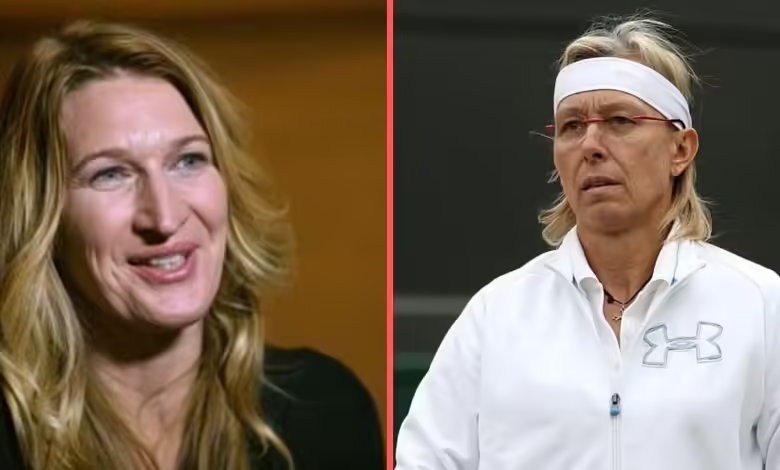“If it doesn’t show, I don’t care”- When Steffi Graf responded to Martina Navratilova’s claims that she found no pleasure in tennis

Steffi Graf’s Passion for Tennis: A Glimpse into the Mindset of a Champion
In the pantheon of tennis legends, few names resonate as powerfully as Steffi Graf and Martina Navratilova. Both women have left indelible marks on the sport, not just through their impressive array of titles but also through their distinct approaches to the game. A fascinating exchange between these icons offers a unique window into their contrasting philosophies, particularly highlighted by Graf’s response to Navratilova’s claims about finding no pleasure in tennis.
Martina Navratilova, a powerhouse on the court known for her tenacity and relentless pursuit of excellence, has often spoken about the mental and emotional toll of professional tennis. In one of her candid moments, she admitted to struggling with finding joy in the sport despite her monumental success. This admission was both surprising and relatable, shedding light on the pressures faced by elite athletes.
In contrast, Steffi Graf, who amassed an incredible 22 Grand Slam singles titles during her career, presented a different perspective. When asked about Navratilova’s sentiments, Graf’s response was succinct and telling: “If it doesn’t show, I don’t care.”
Graf’s Mindset
Graf’s reply encapsulates her pragmatic and focused approach to tennis. For her, the visible results on the court were paramount. This attitude is emblematic of Graf’s career, where her actions and results spoke louder than words. Graf’s emphasis was on performance and achievement, suggesting that internal struggles or lack of enjoyment did not deter her from pursuing excellence.
This mindset is reflective of many top athletes who compartmentalize their emotions to prioritize their goals. For Graf, the joy of tennis was intrinsically linked to the process of winning, improving, and maintaining her dominance. Her response implies that personal feelings of pleasure were secondary to the satisfaction derived from success and accomplishment.
The Different Approaches
Navratilova and Graf’s differing viewpoints highlight the diverse ways athletes cope with the demands of professional sports. Navratilova’s openness about her struggles brought attention to the mental health challenges athletes face, helping to destigmatize discussions around the pressures of competitive sports. Her willingness to share her vulnerabilities has been instrumental in fostering a more empathetic understanding of athletes’ experiences.
On the other hand, Graf’s pragmatic approach underscores a stoic dedication to her craft. Her focus on outcomes over personal enjoyment reflects a mentality often necessary to reach the pinnacle of success. Graf’s ability to prioritize her professional goals, even at the expense of personal pleasure, illustrates a level of discipline and commitment that is both admirable and daunting.
The Legacy
Both approaches have left lasting legacies in the world of tennis. Navratilova’s candidness about her lack of pleasure in tennis has opened doors for discussions on mental health, resilience, and the psychological aspects of professional sports. Her honesty has provided comfort to many athletes who experience similar feelings, reinforcing that even the greatest champions face internal battles.
Graf, meanwhile, remains a symbol of unwavering focus and excellence. Her response to Navratilova’s claims serves as a reminder that there is no single path to success. For some, the joy of the sport lies in the love of the game itself, while for others, it is found in the relentless pursuit of victory and the external validation it brings.
The exchange between Steffi Graf and Martina Navratilova offers valuable insights into the varied emotional landscapes of professional athletes. Graf’s “If it doesn’t show, I don’t care” response underscores a commitment to performance that prioritizes external success over internal satisfaction. Both Graf and Navratilova, through their words and actions, have enriched the sport of tennis, providing fans and fellow athletes with profound lessons on dedication, resilience, and the pursuit of greatness.



